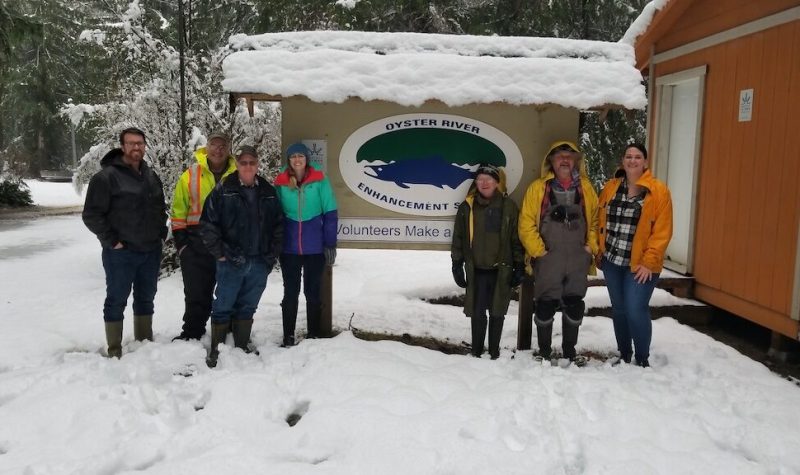By Roy L Hales
Cermaq Canada has donated more than $2 million to local communities since 2018.
Campbell River’s two other fish farm companies, MOWI Canada West and Grieg Seafood, also made substantial donations.
Cermaq’s donations
Linda Sams, Sustainable Development Director at Cermaq Canada explained, “It is part of our culture and we have a shared value approach. Meaning that we are part of communities and we believe we need to add value to the communities we operate in.”
Cermaq has a volunteer donations committee made up of employees from both the Tofino and Campbell River offices, They meet monthly to review applications and decide which programs to sponsor.
“The vast majority of our support falls under $1,000, which is why we can support hundreds of associations, organizations, events, initiatives and projects,” emailed Communications and Engagement Manager Amy Jonsson.
“Some examples include the Special Olympics, the Campbell River Hospital Foundation, countless youth sports teams across the Island, support for local salmon enhancement groups like the Oyster River Enhancement society and the Thornton Creek Hatchery. We have also supported school beach clean-ups and community events, festivals and initiatives such as Salmon Fest and Canada Day celebrations.”
Cermaq provided funding, volunteers and equipment loans for habitat restoration and mitigation work in the Clayoqout Sound area.
COVID changed the pattern of donations.
Jonsson explained, “In 2020 and 2021, the majority of our support has been focused on supporting communities and the needs of families during the pandemic. In 2020, we donated 60,000 pounds of fresh, premium salmon, and paid for the canning at St. Jean’s Smokehouse and Cannery (to make is shelf stable), or which 3,500 cans were provided to seven local food banks here on the Island (Campbell River, Port McNeill, Port Alberni, Ucluelet, Tofino, Duncan, and the Comox Valley) as well as Richmond and Feed Nova Scotia. All nine of these food banks also received $2,500 in cash to help them meet the community need. The remaining canned salmon, was donated to both FoodBankBC and FoodBank Canada for distribution across BC and Canada.
Jonsson also provided a sampling of events from 2018 and 2019, when events and gatherings could still occur.

Data from Cermaq Canada; Chart by Roy L Hales

the Campbell River all-season playing field – courtesy Cermaq Canada
Remarks by two Campbell River Council members
The question of donations arose because of remarks made by two Campbell River Council members.
Charlie Cornfield said the DFO’s recent decision to phase out fish farming in the Discovery Islands “is based on social license, not science and not even informed.”
Mayor Andy Adams made a similar remark, saying that by supporting the open net fish farms he was “in support of dealing with the facts of science, technology and innovation.”
This apparent one sided perspective of ‘science’ prompted the question, where are they getting their information?
A quick perusal of the city of Campbell River minutes produced 56 entries from MOWI Canada West, 50 from Cermaq Canada and 41 from Greg Seafood BC Ltd.
There are no direct communications from critics of the industry like independent biologist Alexandra Morton, Stan Proboszcz of the Watershed Watch Salmon Society or Krisiti Miller-Saunders, head of the DFO’s molecular genetics laboratory at the Pacific Biological Station in Nanaimo.
The few entries pertaining to Morton and Miller-Saunders were references to their work made by third parties.
A search for Proboszcz returned ‘no results.’

Photo courtesy Cermaq Canada
We go around to councils
Linda Sams confirmed, “We do go around to councils and provide updates. We try to do it once a quarter. That’s more around our certification requirement to make sure we are engaging with local government and communities, keeping people updated on what we are doing. I think it is important to work with local councils and local governments. That is something Cermaq participates in.”
To which it might be added that while fish farms are an integral part of Campbell River community, critics like Morton, Poboszcz or Miller- Saunders do not live in the greater Campbell River area.
Are Fish Farms ‘scientific’ and their critics not?
So what about the idea that scientists criticizing the industry aren’t scientific, does Cermac agree with this?
“I don’t think Cermaq ever makes a statement that one science is better than the other. I think we need to look at all opinions and all science. This informs our decision making. We try to have an open mind. We don’t always agree on all of the conclusions that are drawn from some of the work that is done, but we certainly acknowledge and listen to all contributions,” said Sams.
In July 2020, Cortes Currents witnessed the speed with which Cermaq Canada responds to criticism. Living Oceans had just given a failing grade to the aquaculture industries attempts to deal with sea lice, in a report entitled Lousy Choices II.
When Cortes Currents contacted David Kiemele, Managing Director of Cermaq, his company was already at least partially implementing 6 of the report’s 8 recommendations.
Giving is a Canadian ethic
But this story is really about donations.
Linda Sams explained, “Giving is a very Canadian ethic and it is no different with all the employees and our company. Obviously we bring employment and economic activity. All of that has been talked about a lot recently. Also, we’d like to make sure we are contributing to priorities and needs in the communities where we operate. The vast majority are actually happening in the small communities where we actually farm. That is probably more to do with our employees, where they live and where their families are.”


